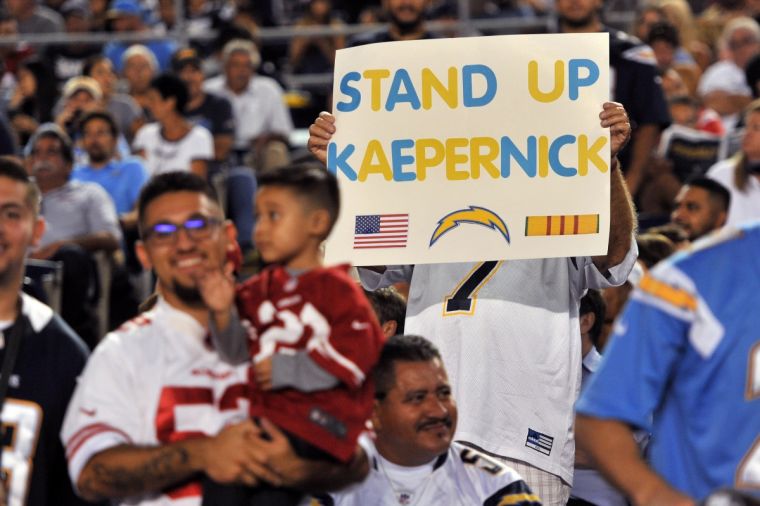
(Reuters)
Those of you who, like me, can’t look away from the never boring world of American politics may be aware of the current controversy engulfing the National Football League (NFL). Following the lead of quarterback Colin Kaepernick, a number of players have used the symbolism of kneeling rather than standing during the singing of the national anthem as a form of political dissent.
This has stirred a huge amount of controversy, with everyone from the President down weighing in on whether this is appropriate or not. Those on Kaepernick’s side have claimed that he is being penalised by the NFl and by the power bloc of franchise owners, and that his career is suffering because of it. Those opposing his stance say that he disrespecting the country by protesting during the anthem, and that as someone who has benefitted from sport he is being ungrateful.
Buying Their Silence?
Plenty of other people have written far better and far more on the rights and wrongs of that particular issue than I could but, regardless of the specifics of why they are protesting, it raises an argument that comes up again and again when covering sport. One of the criticisms being levelled at these athletes is that politics has no place in sport and professional sportspeople should remain silent on the topic.
It’s not just that what people usually really mean is that they want politics that disagree with their own kept out of sport, it’s that we are constantly demanding that our athletes be role models, and expecting them to maintain certain standards of behaviour. So, which is it? Does nothing matter other than how they perform on the field when the whistle blows, or are their behaviour and actions as individuals important?
More than a Game
If we expect athletes to be role models and represent certain values, we are admitting that there is a moral—and political—dimension to sport beyond the result. Some of sport’s greatest moments have come when sports people have chosen to do things that show winning is not more important than doing what they believe is right—like stopping to help a fallen opponent or walking when given not out—or when it has been used as a platform to speak out against injustice—like Flower and Olonga wearing armbands in protest against human rights abuses.
Time to Make Up Our Minds
So, what is that we want? Do we want sport to be apolitical and morally neutral, and have no significance beyond the result at the end of the day? Or do we want it to represent certain things, and inspire us to be something more? If so, to ask athletes to ignore their consciences and values, and not speak out against things they see as wrong, is sending a very dangerous message.
Instead of labelling athletes like Kaepernick as spoilt, or ungrateful for the privileges and riches that sport has brought them, we should be admiring their willingness to risk that for a moral principle, even if it’s something we might not agree with. And, whether it is a US sport or not, as Australians, since when did we side with the establishment, instead of rooting for the underdog, the individual standing up to the rich and powerful who are trying to spin this to make themselves look like the friend of the common people?
You Either Stand for Something...Or Nothing
I want sports to mean something. I know there will be times when I might disagree with what certain athletes have to say, that’s the way it works in a free society. When it comes down to it, I know that I would rather have athletes who at least stand—or, in this case, not stand—for something, than stand for nothing at all.

David Goodwin is the Editor of The Salvation Army’s magazine,War Cry. He is also a cricket tragic, and an unapologetic geek.
David Goodwin's archive of articles may be viewed at http://www.pressserviceinternational.org/david-goodwin.html

David Goodwin is the former Editor of The Salvation Army’s magazine,War Cry. He is also a cricket tragic, and an unapologetic geek.
David Goodwin archive of articles may be viewed at http://www.pressserviceinternational.org/david-goodwin.html